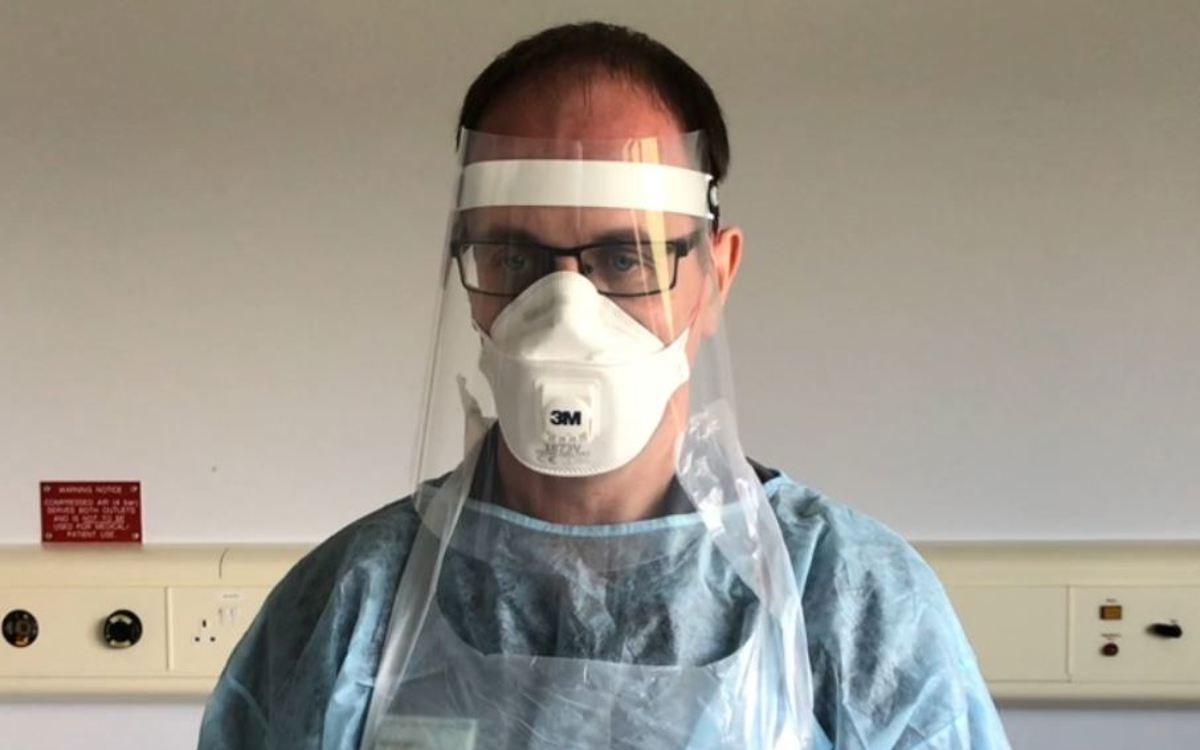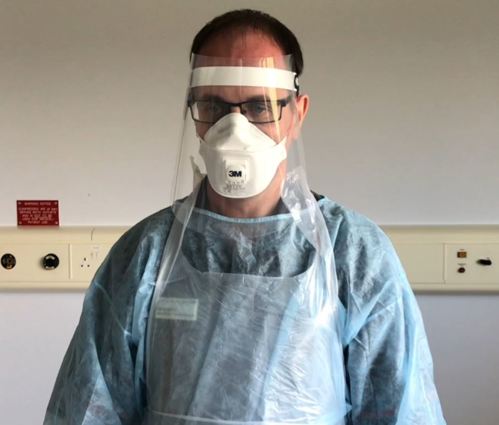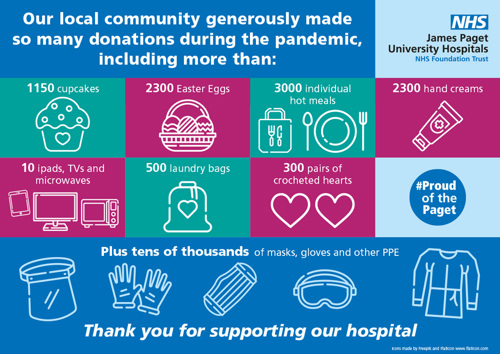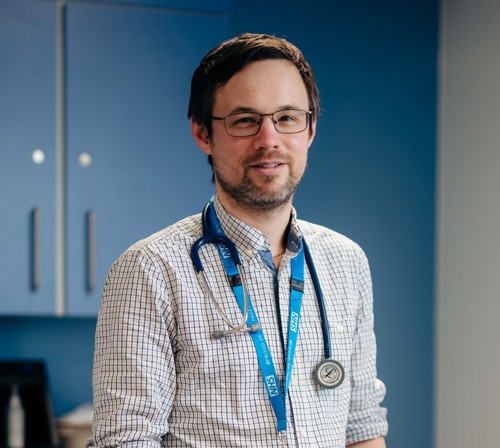
The James Paget is taking part in a special day of reflection, to mark the fifth anniversary of the COVID pandemic.
Sunday 9 March 2025 is the Day of Reflection across the UK for the COVID-19 pandemic – and is an opportunity for people to come together to remember those who have lost their lives since the pandemic began and to honour the tireless work and acts of kindness shown during this unprecedented time.
The day is being held in line with a recommendation from the UK Commission on Covid Commemoration.
On Sunday 9 March 2025, people are invited to:
- remember and commemorate those who lost their lives since the pandemic began
- reflect on the sacrifices made by many, and on the impact of the pandemic on us all
- pay tribute to the work of health and social care staff, frontline workers and researchers
- appreciate those who volunteered and showed acts of kindness during this unprecedented time
In the week leading up to the Day of Reflection we are publishing some short stories from our members of staff, containing some of their recollections of working in the hospital during the pandemic:
The arrival of COVID-19 put one hospital team firmly in the spotlight.
Our Infection Prevention and Control team (IPAC) are responsible for advising on the management of infectious conditions and measures to minimise the transmission of bacteria and viruses in the hospital, to protect both patients and staff.
Their role includes ensuring that patients with infections are cared for away from those who are virus-free – and that staff providing their care follow hygiene practices and wear appropriate protective equipment.
‘Everyone’s attention turned to infection control during the pandemic,” recalled Kevin Baker, the hospital’s Head of Infection Prevention and Control.
“When we arrived on the wards, a crowd would form around us because people were worried – and they hung on our every word.”
“There was no manual for this: COVID-19 was a new virus that experts knew little about but what was crucial was trusting our experience of similar viruses and tried and tested methods in containing infection outbreaks in the past.”
Kevin and his team worked closely with the hospital’s estates department to advise on changes to ward bays to minimise the spread of COVID – and with the procurement team to monitor stocks of Personal Protective Equipment (PPE) such as masks, gloves and aprons.
“Some of the teams we had not had regular involvement with and consequently, we learnt a lot about their role. Everyone pulled together, which was really good to see.”
National guidance changed as more became known about the virus – and in the hospital, the IPAC team had to rapidly adapt these requirements to the practices in the Trust.
“It really was a time when infection prevention was at the forefront of everyone’s minds, both in and out of the hospital,” added Kevin. “It needs to remain on people’s radar because there will always be viruses and bacteria that can cause harm. This is why it is essential that practices like good hand hygiene and good PPE practice are still followed rigorously.”


A key challenge of COVID-19 was not only treating patients suffering from the illness – but preventing those who were virus-free from contracting it while in hospital.
That’s where the expertise of our estates team played a vital role.
As it became clear that the virus was spreading in our local community, our estates team devised a plan to ‘zone’ the hospital, working closely with our clinical and infection control teams.
Red zones were for patients with COVID-19 and the staff treating them, while green areas were reserved to care for those without the virus.
The zoning work included creating a separate COVID A&E area, complete with a dedicated entrance, away from our main Emergency Department; dividing open plan wards to create sealed bays to prevent the virus from spreading; and installing signage to ensure compliance with mask-wearing, social distancing and one-way pedestrian systems.
“It was a massive challenge but exciting too – and it showed the NHS at its best,” said Steve Balls, Deputy Director of Estates and Facilities. “Everyone pulled together and it showed how all the cogs in the NHS machine are needed to maintain services for our patients - not just the front line staff but support staff too.”
The estates team was also instrumental in boosting the hospital’s oxygen supply and then enhancing systems to monitor its use across the hospital, as demand increased due to numbers of patients needing support with their breathing.
“It was fast-paced and relentless, but whatever the pandemic threw at us, we dealt with it,” added Steve.

Good hospital care is built on the foundations of hygiene and cleanliness, to prevent the spread of infection.
Therefore, the role of our Domestic Services team during the pandemic was absolutely crucial in ensuring that the James Paget could provide help to people hospitalised due to COVID-19.
On a daily basis, the team are responsible for cleaning ward bays, side rooms, bathrooms and clinical areas – and are also called on to perform ‘deep cleans’ to disinfect bed spaces where infectious patients have been treated.
Deep cleans involve thorough cleaning of all furniture, beds, floor and even the walls, as well as changing fittings such as curtains.
These are performed regularly by the team but their frequency escalated dramatically during the pandemic – at one point reached more than 1000 in one month.
“It was incredibly hard work and the worst of times. But from a team perspective, it was the best of times as everyone pulled together,” Domestic Supervisor Sandra Lock.
“Our staff came in, day after day, to carry out long shifts – I was so proud of them.”
“The dedication was amazing,” added Domestic Supervisor Maria Barravas. “We had one member of staff who was not allowed to come into the hospital because of a health condition that made her vulnerable. But she was on the phone asking if there was anything she could do to help – she wanted to play her part.”
Normally used to cleaning with just gloves and an apron, the domestic staff had to wear the same personal protective equipment (PPE) that was being worn by ward staff. This meant being ‘fit tested’ for a mask to protect them from the virus.
“It was frightening – a real fear of the unknown,” added Amber Reynolds, also a Domestic Supervisor.
“There were some really long hours and we were doing deep cleans through the night – but we got through thanks to some great teamwork,” she added.

A hospital produces vast quantities of waste on a daily basis, much of which is infectious and needs careful handling.
The safe removal of everything from swabs, dressings and soiled linens to used needles and syringes is the responsibility of our waste porters, who have a strict daily regime of visits to wards and clinical areas.
This regime of disposing of highly-infectious clinical waste was essential during the COVID pandemic, when keeping ward areas as clean as possible was so important.
Waste Team Leader Craig Sansom was in charge of the waste porters throughout the pandemic.
It was his role to ensure that the team had the correct personal protective equipment (PPE) when working in ward areas; that they had enough clean uniforms; and that they were looking after themselves and had a focus on their wellbeing.
“Because of the nature of the role, it was particularly ‘high risk’ during the pandemic,” said Craig.
“It was such a worrying time, people were dying – and everyone had friends or family members who were affected by the disease.
“Even though they knew the risks, my staff went onto the wards without hesitation – it made me so proud.”

The restrictions which came into place to control the pandemic were particularly challenging in hospitals, where patient visiting was temporarily suspended.
For families with relatives receiving care on a ward, including patients reaching the end of their lives, the ban on visiting was especially difficult.
But one hospital team was able to facilitate that crucial contact between patient and family – as well as provide constant support for staff who were tested to their limits: the Chaplaincy Team.
“It was an incredibly hard time for people with loved ones in hospital. There was a communication gap – but we did our best to fill it,” said Deputy Lead Chaplain, Revd Danny Pritchard.
“I will never forget sitting with a patient who was very ill, whose husband could not visit because of the restrictions. I visited her regularly, and made sure I phoned her husband every day to update him on how she was doing. But, sadly, she passed away - so the day she went into hospital was the last day her husband ever saw her.”
The Chaplaincy team had to put on the same Personal Protective Equipment (PPE) that was being worn by ward staff when visiting patients – which presented its own problems.
“The mask was a big barrier,” said Lead Chaplain Revd Clive Howard. “It hides your expressions – and you have to try to communicate with your eyes. We had gloves on so you couldn’t touch someone’s hand – it really restricted our ability to show empathy.”
“But what we could do was be available for our staff and patients. During the pandemic, our ward staff were so busy that they didn’t have time to sit down for a chat with patients. That’s where we came in – and, being on-site throughout, we could respond quickly,” he added.
The Chaplaincy has always been a much-valued team at the James Paget – but its reputation has grown as a result of its work during the pandemic.
“The fact that so many more people around the hospital are now aware of the Chaplaincy and what support it can offer is a real positive that has come from the most challenging of times,” added Danny.

One of the James Paget’s wards become a focal point for the treatment of patients who had become extremely unwell with COVID-19.
While COVID patients were receiving care in wards across the hospital, the team on Ward 16 were focussed on those who were the sickest, other than those that needed support from our intensive care unit.
Among the team caring for patients on the ward was Physician Associate Matthew Whelband.
“Looking back, it’s all a bit of a blur. But it was traumatic –you couldn’t quite believe it was happening and it was so hard not to become emotionally involved.
“There were days when a number of patients died on the ward due to COVID – and our role then was to support and comfort them as best we could as they passed away.”
Staff worked long shifts in full personal protective equipment (PPE) – and it was hot and difficult to take breaks.
But there were stories of hope and recovery.
“There were patients who recovered. I can remember one patient who was really unwell who went on to make a full recovery and return to work – it was a good news story when there were so many people dying.”
At the start of the pandemic, there were no treatments for COVID. So Matthew and his colleagues on Ward 16 were in the forefront of research trials to help combat the disease – something that was mirrored in hospitals across the country and eventually lead to the identification of effective treatments.
But Matthew’s clearest memory is of the exceptional teamwork which saw the Ward 16 team through the toughest of times.
“To cope with this, we had to work together – and that’s what we did. The nurses and staff across the ward were simply outstanding,” he added.

The thousands of items donated to staff at the James Paget during the pandemic underlined just how much local people wanted to support their hospital.
Charity Manager Maxine Taylor found herself in a new role of donations co-ordinator, assisted by three other members of staff: Sam, Amber and Emma.
Their task was to receive and distribute all the items which turned up at the hospital on a daily basis, as the NHS became the focus of a surge of goodwill from the public.
“There was everything – toiletries, food, chocolate, drinks and cupcakes by the bucketful. Most days, there was a constant stream of white vans pulling up at hospital entrance, bearing donations from the local community,” said Maxine.
Ensuring that the donations got to teams right across the hospital, including items where the donor had specified where they should go, was a logistical challenge.
But Maxine and her team set up a process to sort and box up items, and then distribute them across wards and departments, ensuring that some were allocated for staff on night shifts.
“I’ve never worked so hard,” said Maxine. “Sometimes I was recording 30,000 steps in a day!”
The generosity of the local community was not a total surprise to Maxine though, who has seen how it has rallied behind the hospital for numerous charity appeals over the years.
“We are so lucky with our local community. They have supported numerous charity appeals over the years but really went above and beyond during the pandemic.
“We can’t thank them enough. Their generosity played a huge role in boosting staff morale during the most testing of times.”


Specialist Nurse Siji Dileep played a key role in helping bring the pandemic to an end - by administering the very first COVID-19 vaccination at the James Paget.
The date of 9 December 2020 will be forever etched on Siji’s mind as it was the day when the first groups of local people, deemed to be the highest priority, received their jabs in a vaccination centre which had been set up in the hospital’s physiotherapy gym.
Siji was one of the hospital’s vaccinators that day, having volunteered for the role as she had experience and training through assisting with the hospital’s staff flu campaigns in previous years.
“I was also aware that this was going to be the largest vaccination programme in the NHS’ history and really wanted to play my part,” said Siji, who has now worked at the James Paget for 20 years.
“There were three or four of us giving the vaccines that first morning - but I had no idea that I would be performing the very first one.”
Giving the first COVID vaccine at the hospital came with the additional pressure of administering it in front of the local media, who came to the James Paget to record this historic event.
“I was nervous but excited too,” said Siji. “To give the first COVID vaccine at the James Paget was a real privilege. We had been through so much as a country, community and hospital – and to be able to start delivering the life-saving vaccine felt like we were on a path to better days.”


While the COVID pandemic was the most challenging of times for our hospital, it resulted in the rapid development of new ways of working, assisted by technology, which continue to benefit our patients today.
Among them was the creation of the ‘virtual ward’ which allowed patients to have their care managed in the comfort of their own home rather than in hospital.
Virtual wards were set up at NHS hospitals across the country during the pandemic, to care for COVID-19 patients.
At the James Paget, the virtual ward went live in January 2021. Patients on the ward provided readings from a device called a ‘pulse oximeter’ which measures oxygen levels in the blood, and were closely monitored by clinicians through regular phone calls.
The creation of the virtual ward brought a number of positives, including the ability to discharge COVID patients no longer needing hospital care, helping free-up beds. It also helped vulnerable patients who had contracted the virus to be monitored at home so they did not have to come into the hospital, where they could pick up other infections.
The success of the ward is demonstrated by the fact that only 36 out of more than 430 patients receiving care, in the first 15 months of its operation, needed to come into hospital.
“It gave us confidence that the concept of the virtual ward worked” said Consultant and Clinical Lead in Acute Medicine Dr Dominic Giles, who was instrumental in setting up the ward at the James Paget.
Back in 2021, the James Paget virtual ward had capacity for 10 COVID patients. Now, it can provide care for some 50 patients, with a range of conditions including COPD, diabetes, asthma, cellulitis, heart failure and pulmonary fibrosis.
“COVID was the catalyst for the establishment of virtual wards across the country – and they are now very much an important part of hospital care and are here to stay,” added Dr Giles.

